Recent and Forthcoming work by our members

Carol Johnson, Social Democracy and the Crisis of Equality: Australian Social Democracy in a Changing World
This book analyses social democratic parties’ attempts to tackle inequality in increasingly challenging times. It provides a distinctive contribution to the literature on the so-called ‘crisis’ of social democracy by exploring the role of equality policy in this crisis. While the main focus is on analysing Australian Labor governments, examples are also given from a wide range of parties internationally.
This book analyses social democratic parties’ attempts to tackle inequality in increasingly challenging times. It provides a distinctive contribution to the literature on the so-called ‘crisis’ of social democracy by exploring the role of equality policy in this crisis. While the main focus is on analysing Australian Labor governments, examples are also given from a wide range of parties internationally.
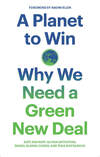
Kate Aronoff, Alyssa Battistoni, Daniel Aldana Cohen, and Thea Riofrancos, A Planet to Win: Why We Need a Green New Deal
The age of climate gradualism is over, as unprecedented disasters are exacerbated by inequalities of race and class. We need profound, radical change. A Green New Deal can tackle the climate emergency and rampant inequality at the same time. Cutting carbon emissions while winning immediate gains for the many is the only way to build a movement strong enough to defeat big oil, big business, and the super-rich—starting right now.
A Planet to Win explores the political potential and concrete first steps of a Green New Deal.
The age of climate gradualism is over, as unprecedented disasters are exacerbated by inequalities of race and class. We need profound, radical change. A Green New Deal can tackle the climate emergency and rampant inequality at the same time. Cutting carbon emissions while winning immediate gains for the many is the only way to build a movement strong enough to defeat big oil, big business, and the super-rich—starting right now.
A Planet to Win explores the political potential and concrete first steps of a Green New Deal.
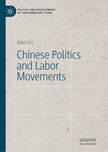
Jake Lin, Chines Politics and Labor Movements
This book brings a radically new voice to the debate in the field of Chinese politics and labor movement. Using a psychological and cognitive approach, the author examines workers and activists’ everyday interpretation of the source of their problems, their prospect of labor movements, and their sense of solidarity. The project shows how workers themselves have become a part of the apparatus of state repression and argues that Chinese workers have not acquired sufficient cognitive strength to become the much hoped-for agent for political change, which hinders labor activism from developing into a sustainable social movement.
This book brings a radically new voice to the debate in the field of Chinese politics and labor movement. Using a psychological and cognitive approach, the author examines workers and activists’ everyday interpretation of the source of their problems, their prospect of labor movements, and their sense of solidarity. The project shows how workers themselves have become a part of the apparatus of state repression and argues that Chinese workers have not acquired sufficient cognitive strength to become the much hoped-for agent for political change, which hinders labor activism from developing into a sustainable social movement.

Paulo Ravecca, The Politics of Political Science: Re-Writing Latin American Experiences
In this thought-provoking book, Paulo Ravecca presents a series of interlocking studies on the politics of political science in the Americas. Focusing mainly on the cases of Chile and Uruguay, Ravecca employs different strands of critical theory to challenge the mainstream narrative about the development of the discipline in the region, emphasizing its ideological aspects and demonstrating how the discipline itself has been shaped by power relations.
In this thought-provoking book, Paulo Ravecca presents a series of interlocking studies on the politics of political science in the Americas. Focusing mainly on the cases of Chile and Uruguay, Ravecca employs different strands of critical theory to challenge the mainstream narrative about the development of the discipline in the region, emphasizing its ideological aspects and demonstrating how the discipline itself has been shaped by power relations.

Cristina Lafont, Democracy without Shortcuts: A Participatory Conception of Deliberative Democracy
This book articulates a participatory conception of deliberative democracy that takes the democratic ideal of self-government seriously. It aims to improve citizens' democratic control and vindicate the value of citizens' participation against conceptions that threaten to undermine it.
This book articulates a participatory conception of deliberative democracy that takes the democratic ideal of self-government seriously. It aims to improve citizens' democratic control and vindicate the value of citizens' participation against conceptions that threaten to undermine it.

Robert Nichols, Theft is Property! Dispossession and Critical Theory
Drawing upon Indigenous peoples' struggles against settler colonialism, Theft is Property!reconstructs the concept of dispossession as a means of explaining how shifting configurations of law, property, race, and rights have functioned as modes of governance, both historically and in the present.
Drawing upon Indigenous peoples' struggles against settler colonialism, Theft is Property!reconstructs the concept of dispossession as a means of explaining how shifting configurations of law, property, race, and rights have functioned as modes of governance, both historically and in the present.

Abraham A. Singer, The Form of the Firm: A Normative Political Theory of the Corporation
What are we to make of the power that corporations wield over people in modern society? Is such power legitimate? Many think so. To many businessmen and economists, as well as the general public, firms are purely private and economic entities, justified in using all legal means to maximize profit.
What are we to make of the power that corporations wield over people in modern society? Is such power legitimate? Many think so. To many businessmen and economists, as well as the general public, firms are purely private and economic entities, justified in using all legal means to maximize profit.

Jodi Dean, Comrade: An Essay on Political Belonging
In the twentieth-century millions of people across the globe addressed each other as “comrade”. Now, it’s more common to hear talk of “allies” on the left than it is of comrades. In Comrade, Jodi Dean insists that this shift exemplifies the key problem with the contemporary left: the substitution of political identity for a relation of political belonging that must be built, sustained, and defended.
In the twentieth-century millions of people across the globe addressed each other as “comrade”. Now, it’s more common to hear talk of “allies” on the left than it is of comrades. In Comrade, Jodi Dean insists that this shift exemplifies the key problem with the contemporary left: the substitution of political identity for a relation of political belonging that must be built, sustained, and defended.

Gergana Dimova, Democracy Beyond Elections: Government Accountability in the Media Age
This book provides the analytical framework for understanding the relationship between media scandals, executive accountability and the crisis of democracy. The empirical findings are based on an original database of 6000 media allegations and investigations in Russia, Germany and Bulgaria. Observations gained from the case studies are then placed in relation to a systematic analysis and critique of more than 100 models of the transformation and crisis of democracy.
This book provides the analytical framework for understanding the relationship between media scandals, executive accountability and the crisis of democracy. The empirical findings are based on an original database of 6000 media allegations and investigations in Russia, Germany and Bulgaria. Observations gained from the case studies are then placed in relation to a systematic analysis and critique of more than 100 models of the transformation and crisis of democracy.

Julie L. MacArthur, Empowering Electricity: Co-Operatives, Sustainability, and Power Sector Reforms in Canada
Canada is known for being an energy-producing nation – with much attention being paid to the Alberta tar sands and their large carbon footprint. This book looks at a very different part of the Canadian energy sector: the hundreds of renewable energy co-ops that have sprung up across the nation. These co-ops are democratically structured, community-based organizations that use sun, wind, rivers, tides, and plant and animal waste as sources of local power generation.
Canada is known for being an energy-producing nation – with much attention being paid to the Alberta tar sands and their large carbon footprint. This book looks at a very different part of the Canadian energy sector: the hundreds of renewable energy co-ops that have sprung up across the nation. These co-ops are democratically structured, community-based organizations that use sun, wind, rivers, tides, and plant and animal waste as sources of local power generation.

Onur Ulas Ince, Colonial Capitalism and the Dilemmas of Liberalism
By the middle of the nineteenth century, the Britons celebrated their empire as a unique “empire of liberty” that propagated the rule of private property, free trade, and free labor across the globe. They also knew that the same empire had been made by conquering overseas territories, trading in slaves, and extorting tribute from other societies. Set in the context of the early-modern British Empire, this book paints a striking picture of the tensions between the illiberal origins of capitalism and its liberal imaginations in metropolitan thought.
By the middle of the nineteenth century, the Britons celebrated their empire as a unique “empire of liberty” that propagated the rule of private property, free trade, and free labor across the globe. They also knew that the same empire had been made by conquering overseas territories, trading in slaves, and extorting tribute from other societies. Set in the context of the early-modern British Empire, this book paints a striking picture of the tensions between the illiberal origins of capitalism and its liberal imaginations in metropolitan thought.

Terrell Carver, Marx
Karl Marx was the first theorist of global capitalism and remains perhaps its most trenchant critic. This clear and innovative book, from one of the leading contemporary experts on Marx's thought, gives us a fresh overview of his ideas by framing them within concepts that remain topical and alive today, from class struggle and progress to democracy and exploitation.
Karl Marx was the first theorist of global capitalism and remains perhaps its most trenchant critic. This clear and innovative book, from one of the leading contemporary experts on Marx's thought, gives us a fresh overview of his ideas by framing them within concepts that remain topical and alive today, from class struggle and progress to democracy and exploitation.
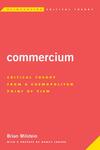
Brian Milstein, Commercium: Critical Theory from a Cosmopolitan Point of View
Since the end of the Cold War, there has been a wealth of discussion and controversy about the idea of a ‘postnational’ or ‘cosmopolitan’ politics. But while there are many normative theories of cosmopolitanism, as well as some cosmopolitan theories of globalization, there has been little attempt to grapple systematically with fundamental questions of structure and action from a ‘cosmopolitan point of view.’ Drawing on Kant‘s cosmopolitan writings and Habermas‘s critical theory of society, Brian Milstein argues that, before we are members of nations or states, we are participants in a ‘commercium’ of global interaction who are able to negotiate for ourselves the terms on which we share the earth in common with one another.
Since the end of the Cold War, there has been a wealth of discussion and controversy about the idea of a ‘postnational’ or ‘cosmopolitan’ politics. But while there are many normative theories of cosmopolitanism, as well as some cosmopolitan theories of globalization, there has been little attempt to grapple systematically with fundamental questions of structure and action from a ‘cosmopolitan point of view.’ Drawing on Kant‘s cosmopolitan writings and Habermas‘s critical theory of society, Brian Milstein argues that, before we are members of nations or states, we are participants in a ‘commercium’ of global interaction who are able to negotiate for ourselves the terms on which we share the earth in common with one another.
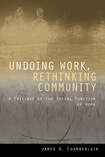
James A. Chamberlain, Undoing Work, Rethinking Community: A Critique of the Social Function of Work
This revolutionary book presents a new conception of community and the struggle against capitalism. In Undoing Work, Rethinking Community, James A. Chamberlain argues that paid work and the civic duty to perform it substantially undermines freedom and justice. Chamberlain believes that to seize back our time and transform our society, we must abandon the deep-seated view that community is constructed by work, whether paid or not.
This revolutionary book presents a new conception of community and the struggle against capitalism. In Undoing Work, Rethinking Community, James A. Chamberlain argues that paid work and the civic duty to perform it substantially undermines freedom and justice. Chamberlain believes that to seize back our time and transform our society, we must abandon the deep-seated view that community is constructed by work, whether paid or not.
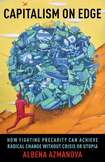
Albena Azmanova, Capitalism on Edge: How Fighting Precarity Can Achieve Radical Change without Crisis or Utopia
The wake of the financial crisis has inspired hopes for dramatic change and stirred visions of capitalism’s terminal collapse. Amid populist upheavals, there has been a new flowering of radical critique, and progressive forces are rallying to fight inequality. Yet is the system indeed on the verge of ruin—or even truly challenged by these developments? In Capitalism on Edge, Albena Azmanova offers a novel diagnosis of the current moment to reveal that the potential for sweeping transformation must come from an unexpected direction.
The wake of the financial crisis has inspired hopes for dramatic change and stirred visions of capitalism’s terminal collapse. Amid populist upheavals, there has been a new flowering of radical critique, and progressive forces are rallying to fight inequality. Yet is the system indeed on the verge of ruin—or even truly challenged by these developments? In Capitalism on Edge, Albena Azmanova offers a novel diagnosis of the current moment to reveal that the potential for sweeping transformation must come from an unexpected direction.
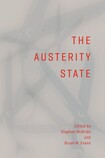
Stephen McBride and Bryan M. Evans (eds.), The Austerity State
The fall-out from the economic and financial crisis of 2008 had profound implications for countries across the world, leading different states to determine the best approach to mitigating its effects. In The Austerity State, a group of established and emerging scholars tackles the question of why states continue to rely on policies that, on many levels, have failed.
The fall-out from the economic and financial crisis of 2008 had profound implications for countries across the world, leading different states to determine the best approach to mitigating its effects. In The Austerity State, a group of established and emerging scholars tackles the question of why states continue to rely on policies that, on many levels, have failed.
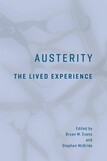
Stephen McBride and Bryan M. Evans (eds.), Austerity: The Lived Experience
Bryan M. Evans, Stephen McBride, and their contributors delve further into the more practical, ground-level side of the austerity equation in Austerity: The Lived Experience.
Bryan M. Evans, Stephen McBride, and their contributors delve further into the more practical, ground-level side of the austerity equation in Austerity: The Lived Experience.
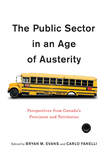
Bryan M. Evans and Carlo Fanelli, The Public Sector in an Age of Austerity
Following the 2008 global financial crisis, Canada appeared to escape the austerity implemented elsewhere, but this was spin hiding the reality. A closer look reveals that the provinces - responsible for delivering essential public and social services such as education and healthcare - shouldered the burden.The Public Sector in an Age of Austerity examines public-sector austerity in the provinces and territories, specifically addressing how austerity was implemented, what forms austerity agendas took (from regressive taxes and new user fees to public-sector layoffs and privatization schemes), and what, if any, political responses resulted.
Following the 2008 global financial crisis, Canada appeared to escape the austerity implemented elsewhere, but this was spin hiding the reality. A closer look reveals that the provinces - responsible for delivering essential public and social services such as education and healthcare - shouldered the burden.The Public Sector in an Age of Austerity examines public-sector austerity in the provinces and territories, specifically addressing how austerity was implemented, what forms austerity agendas took (from regressive taxes and new user fees to public-sector layoffs and privatization schemes), and what, if any, political responses resulted.
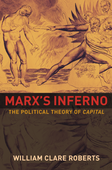
William Clare Roberts, Marx's Inferno: The Political Theory of Capital
Marx’s Inferno reconstructs the major arguments of Karl Marx’s Capital and inaugurates a completely new reading of a seminal classic. Rather than simply a critique of classical political economy, William Roberts argues that Capital was primarily a careful engagement with the motives and aims of the workers’ movement. Understood in this light, Capital emerges as a profound work of political theory. Placing Marx against the background of nineteenth-century socialism, Roberts shows how Capital was ingeniously modeled on Dante’s Inferno, and how Marx, playing the role of Virgil for the proletariat, introduced partisans of workers’ emancipation to the secret depths of the modern “social Hell.” In this manner, Marx revised republican ideas of freedom in response to the rise of capitalism.
Marx’s Inferno reconstructs the major arguments of Karl Marx’s Capital and inaugurates a completely new reading of a seminal classic. Rather than simply a critique of classical political economy, William Roberts argues that Capital was primarily a careful engagement with the motives and aims of the workers’ movement. Understood in this light, Capital emerges as a profound work of political theory. Placing Marx against the background of nineteenth-century socialism, Roberts shows how Capital was ingeniously modeled on Dante’s Inferno, and how Marx, playing the role of Virgil for the proletariat, introduced partisans of workers’ emancipation to the secret depths of the modern “social Hell.” In this manner, Marx revised republican ideas of freedom in response to the rise of capitalism.
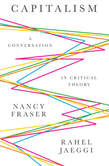
Nancy Fraser and Rahel Jaeggi, Capitalism: A Conversation in Critical Theory
In this important new book, Nancy Fraser and Rahel Jaeggi take a fresh look at the big questions surrounding the peculiar social form known as “capitalism,” upending many of our commonly held assumptions about what capitalism is and how to subject it to critique. They show how, throughout its history, various regimes of capitalism have relied on a series of institutional separations between economy and polity, production and social reproduction, and human and non-human nature, periodically readjusting the boundaries between these domains in response to crises and upheavals.
In this important new book, Nancy Fraser and Rahel Jaeggi take a fresh look at the big questions surrounding the peculiar social form known as “capitalism,” upending many of our commonly held assumptions about what capitalism is and how to subject it to critique. They show how, throughout its history, various regimes of capitalism have relied on a series of institutional separations between economy and polity, production and social reproduction, and human and non-human nature, periodically readjusting the boundaries between these domains in response to crises and upheavals.
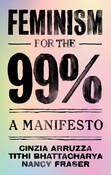
Cinzia Arruzza, Tithi Bhattacharya, and Nancy Fraser, Feminism for the 99%: A Manifesto
Unaffordable housing, poverty wages, inadequate healthcare, border policing, climate change—these are not what you ordinarily hear feminists talking about. But aren’t they the biggest issues for the vast majority of women around the globe?Taking as its inspiration the new wave of feminist militancy that has erupted globally, this manifesto makes a simple but powerful case: feminism shouldn’t start—or stop—with the drive to have women represented at the top of their professions. It must focus on those at the bottom, and fight for the world they deserve. And that means targeting capitalism. Feminism must be anticapitalist, eco-socialist and antiracist.
Unaffordable housing, poverty wages, inadequate healthcare, border policing, climate change—these are not what you ordinarily hear feminists talking about. But aren’t they the biggest issues for the vast majority of women around the globe?Taking as its inspiration the new wave of feminist militancy that has erupted globally, this manifesto makes a simple but powerful case: feminism shouldn’t start—or stop—with the drive to have women represented at the top of their professions. It must focus on those at the bottom, and fight for the world they deserve. And that means targeting capitalism. Feminism must be anticapitalist, eco-socialist and antiracist.
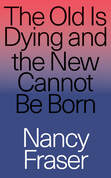
Nancy Fraser, The Old is Dying and the New Cannot be Born: From Progressive Neoliberalism to Trump and Beyond
The global political, ecological, economic, and social breakdown—symbolized by Trump’s election—has destroyed faith that neoliberal capitalism is beneficial to the majority. Nancy Fraser explores how this faith was built through the late twentieth century by balancing two central tenets: recognition (who deserves rights) and distribution (who deserves income). When these begin to fray, new forms of outsider populist politics emerge on the left and the right.
The global political, ecological, economic, and social breakdown—symbolized by Trump’s election—has destroyed faith that neoliberal capitalism is beneficial to the majority. Nancy Fraser explores how this faith was built through the late twentieth century by balancing two central tenets: recognition (who deserves rights) and distribution (who deserves income). When these begin to fray, new forms of outsider populist politics emerge on the left and the right.
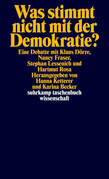
H. Ketterer and K. Becker (eds.) Was stimmt nicht mit der Demokratie? Eine Debatte mit Klaus Dörre, Nancy Fraser, Stephan Lessenich und Hartmut Rosa.
Angesichts der gegenwärtigen ökonomischen, ökologischen und sozialen Krisen zeichnet sich ab, dass die Wachstumsdynamik moderner Gesellschaften nicht mehr stabilisierend wirkt, sondern selbst zum Krisentreiber geworden ist. In diesem Band diskutieren die Philosophin Nancy Fraser und die Soziologen Klaus Dörre, Stephan Lessenich und Hartmut Rosa, was dies für die Gegenwart und die Zukunft der Demokratie bedeutet und welche Konzeptionen und Wege hin zu einer demokratischen Transformation vorstellbar sind. Aus ihrer demokratietheoretischen Perspektive intervenieren Viviana Asara, Banu Bargu, Ingolfur Blühdorn, Robin Celikates, Lisa Herzog, Brian Milstein, Michelle Williams und Christos Zografos.
Angesichts der gegenwärtigen ökonomischen, ökologischen und sozialen Krisen zeichnet sich ab, dass die Wachstumsdynamik moderner Gesellschaften nicht mehr stabilisierend wirkt, sondern selbst zum Krisentreiber geworden ist. In diesem Band diskutieren die Philosophin Nancy Fraser und die Soziologen Klaus Dörre, Stephan Lessenich und Hartmut Rosa, was dies für die Gegenwart und die Zukunft der Demokratie bedeutet und welche Konzeptionen und Wege hin zu einer demokratischen Transformation vorstellbar sind. Aus ihrer demokratietheoretischen Perspektive intervenieren Viviana Asara, Banu Bargu, Ingolfur Blühdorn, Robin Celikates, Lisa Herzog, Brian Milstein, Michelle Williams und Christos Zografos.
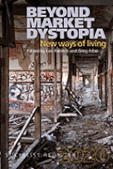
Nancy Fraser, "What should socialism mean in the 21st century?" in Socialist Register 2020: Beyond Market Dystopia
How can we build a future with better health and homes, respecting people and the environment?
Connecting with and going beyond classical socialist themes, each essay in this volume combines analysis of how we are living now with plans and visions for new strategic, programmatic, manifesto-oriented directions for alternative ways of living.
How can we build a future with better health and homes, respecting people and the environment?
Connecting with and going beyond classical socialist themes, each essay in this volume combines analysis of how we are living now with plans and visions for new strategic, programmatic, manifesto-oriented directions for alternative ways of living.
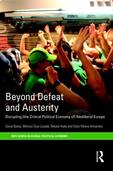
David J Bailey, Mònica Clua-Losada, Nikolai Huke, Olatz Ribera-Almandoz, Beyond Defeat and Austerity: Disrupting the (Critical Political Economy) of Neoliberal Europe
Much of the critical discussion of the European political economy and the Eurozone crisis has focused upon a sense that solidaristic achievements built up during the post-war period are being continuously unravelled. Whilst there are many reasons to lament the trajectory of change within Europe’s political economy, there are also important developments, trends and processes which have acted to obstruct, hinder and present alternatives to this perceived trajectory of declining social solidarity. These alternatives have tended to be obscured from view, in part as a result of the conceptual approaches adopted within the literature.
Much of the critical discussion of the European political economy and the Eurozone crisis has focused upon a sense that solidaristic achievements built up during the post-war period are being continuously unravelled. Whilst there are many reasons to lament the trajectory of change within Europe’s political economy, there are also important developments, trends and processes which have acted to obstruct, hinder and present alternatives to this perceived trajectory of declining social solidarity. These alternatives have tended to be obscured from view, in part as a result of the conceptual approaches adopted within the literature.



